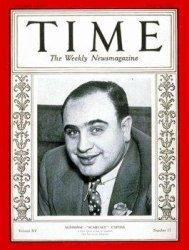
1924 - Election Deal
In the spring of 1924, a democratic win in a local election threatened to reform an area of Chicago called Cicero which was the main headquarters of Capone’s organization. Capone and other leaders in the area needed to block the election to be sure they would have immunity from laws in Cicero.
On Election Day, Capone’s men terrorized democratic candidates and ruined their homes and offices. They threatened voters waiting in line and even held some voters at gun-point until they voted for the candidates Capone needed. The Gangsters beat election workers, killed cops, and shot those who voted the “wrong” way. The election was won by the Klenha faction, supported by Capone and his men.
Becoming Notorious
Capone had broken out of Torrio’s model of being discreet and anonymous in his business. He was becoming so famous that newsmen turned away from President Herbert Hoover in a Miami hotel lobby to flock to Capone. The President had become furious with all of the attention. The public was fascinated by Capone and couldn’t get enough news about him.
William H. McSwiggin, “the hanging prosecutor,” tried to put Capone in jail for murders, but was never able to win a conviction. Witnesses would not testify against Capone and his men out of fear for their lives. Capone’s notoriety was more than ever before.
The Police
Al Capone announced “I own the police” and the 1928 Republican Primary was a good example. It was called the “Pineapple Primary.” Capone’s gangsters bombed homes, murdered party workers, and intimidated voters to be sure the outcome would favor his business.
Frank Loesch was the founding member of the Chicago Crime Commission and was worried that Capone might be able to control the November Presidential election as well. Loesch approached Capone and asked him to “keep your damn cutthroats and hoodlums from interfering with the polling booths!” Capone agreed but also told Loesch what he would need to do on election-day to ensure its success. The police department listened to Capone and even relied on him to organize it. Loesch later said “It turned out to be the most successful Election Day in forty years.” Even the police were under the power of Capone.
The Payroll
Capone had many people on his payroll. It included corrupt policemen, politicians, newspaper reporters and doctors. He would use these people to his own benefit and to protect himself and his gang. He also had henchman who would act as servants, body guards, thugs or worse. Their reputation for protecting Capone was well known. Seeing as Capone's Income was $100,000,000 a year, he had no problem adding as many people to his payroll as he needed.
Money
Al Capone provided the spur for a financial trade destined to encompass a range of sophisticated techniques that he could never have imagined. The trade would become known as money laundering, and it would be more useful than a gun to a criminal.
Celeberty status
Capone reveled in his new found celebrity status and used Damon Runyon
as his press agent. But the damage of all that publicity had been
done. He attracted the attention of President Herbert Hoover. "At
once I directed that all of the Federal agencies concentrate upon Mr.
Capone and his allies," Hoover wrote. In the beginning of March, 1929,
Hoover asked Andrew Mellon, his secretary of the Treasury, "Have you
got this fellow Capone yet? I want that man in jail." A few days
later, Capone was called before a grand jury in Chicago, but did not
seem to understand the seriousness of the powerful forces there were against him.
Hoover was also irritated at the publicity Capone was getting from the press. In a Miami hotel newsmen turned away from Hover and flocked to Capone. He ordered an all out attack on Capone.
Catching Capone
Although Al didn't understand it at the time, the St. Valentine's Day Massacre and the amount of publicity, some of which glamorized Capone and some of which demanded justice, increased the government forces against him. After just a few days in office, Herbert Hoover pressured the Secretary of the Treasury to spearhead the government's battle against Capone.
Mellon
commissioned a two-pronged approach: to get the necessary evidence to
prove income tax evasion and to amass enough evidence to prosecute
Capone successfully for Prohibition violations. Once the evidence was
collected, the Treasury agents were to work with the U.S. Attorney,
George E. Q. Johnson to initiate prosecution of Capone and the key
members of his organization.The man charged with gathering the evidence of Prohibition violations --bootlegging --was Eliot Ness, the man who eventually put Capone behind bars for tax evasion.
QUOTES
"In his forty-eight years, Capone had left his mark on the rackets and on Chicago, and more than anyone else he had demonstrated the folly of Prohibition; in the process he also made a fortune. Beyond that, he captured and held the imagination of the American public as few public figures ever do. Capone's fame should have been fleeting, a passing sensation, but instead it lodged permanently in the consciousness of Americans, for whom he redefined the concept of crime into an organized endeavor modeled on corporate enterprise. As he was at pains to point out, many of his crimes were relative; bootlegging was criminal only because a certain set of laws decreed it, and then the laws were changed." - Bergreen.